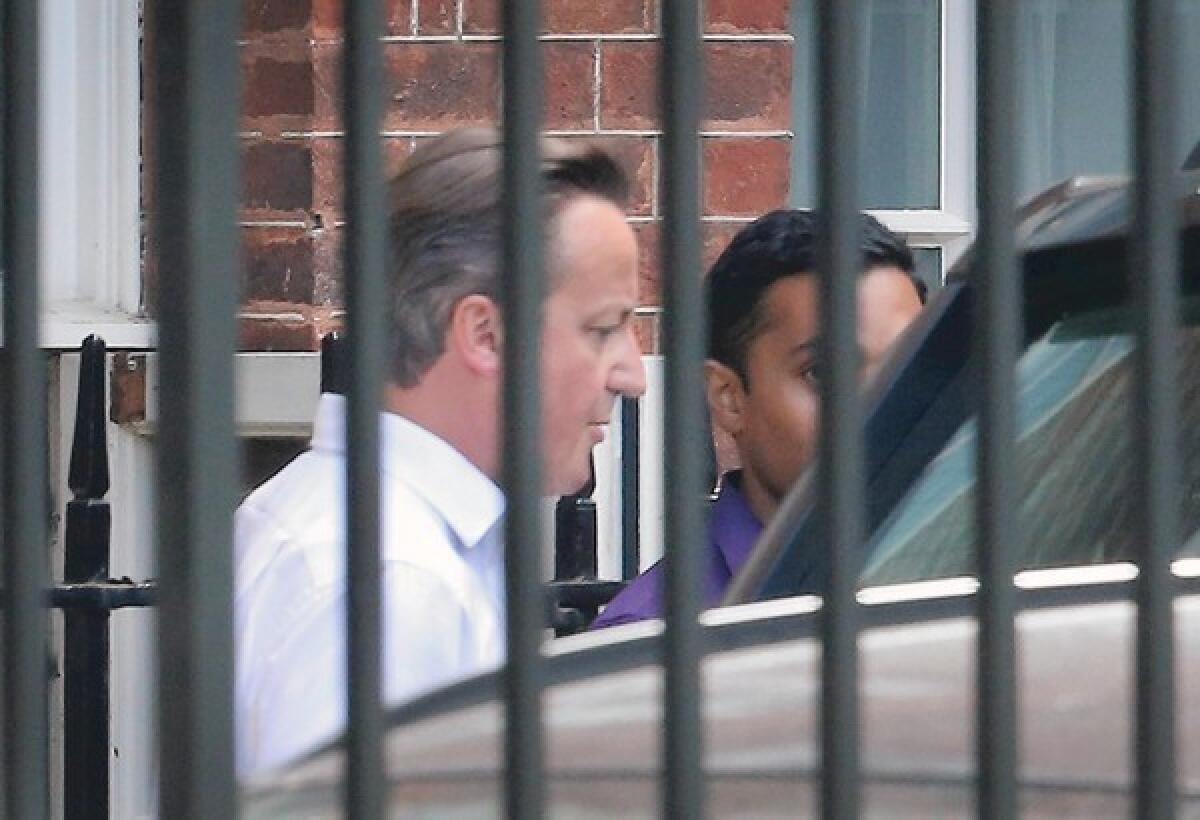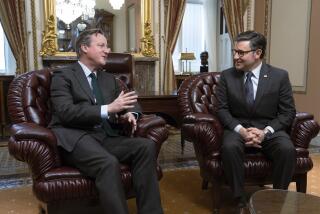Britain’s rejection of action on Syria may have broader implications

LONDON — Has the sun finally stopped setting on the British Empire?
A day after Parliament’s surprising refusal to back a possible international military strike on Syria, Britons both wrung their hands and rejoiced over what some pundits described as the end — yet again — to British imperial pretensions, to punching above the country’s weight on the world stage.
“There will be a national soul-searching about our role in the world, whether Britain wants to play a big part in upholding the international system,” a disappointed George Osborne, a senior Cabinet member, said Friday. “I hope this doesn’t become a moment when we turn our back on all the world’s problems.”
Yet just moments before Osborne spoke, a fellow Conservative said on the same radio program that he would be glad if Britain finally squared its view of itself with reality.
“If that is a consequence of this vote, then I will be absolutely delighted that we relieve ourselves of some of this pretension that a country of our size can seek to be involved in every conceivable conflict that’s going on around the world,” lawmaker Crispin Blunt said. “If it makes British foreign and defense policy rather more limited and rather more sustainable with our own resources and our own size, so much the better.”
Whether the narrow parliamentary vote Thursday night to refrain from joining a Western strike on Damascus actually heralds an isolationist turn for Britain remains to be seen.
In spite of all the talk of a diminished role, Britain retains outsized influence as one of the five permanent members of the United Nations Security Council. It also boasts the world’s fourth-largest military, and it maintains a nuclear arsenal.
But the disastrous experience of the Iraq war has undoubtedly “poisoned the well,” as Prime Minister David Cameron put it, making many of his compatriots skittish about getting involved in other foreign conflicts, especially one centering on another despotic Middle Eastern leader accused of using or harboring weapons of mass destruction.
That leeriness produced the biggest defeat of Cameron’s premiership; his motion asking lawmakers to endorse, merely in principle, the use of force in Syria was rejected in a 285-272 vote. Not even his pledge to seek Parliament’s approval again before an actual military strike — approval he technically does not need as prime minister — was enough to persuade skeptics, including many in his own party who voted against him.
The British media said it was the first time since 1782 that the House of Commons went against the government on a question of war. In that instance, lawmakers voted against continuing the war in the colonies across the Atlantic, which King George III and the prime minister of the day wanted to keep fighting. The vote led to the end of the American Revolution.
The United States loomed large in Thursday’s vote as well, as the likely leader of any armed response against Syrian President Bashar Assad for the alleged use of chemical weapons. Along with President Obama, Cameron has been one of the most outspoken leaders calling for a forceful response.
But the head of the opposition Labor Party captured the public mood better in resisting what appeared to be another inevitable Anglo-American-led attack. Ed Miliband pointedly demanded in Parliament that Britain make its own decisions without heed to an “artificial timetable set elsewhere,” meaning the U.S.
Brits who think their country has spent too much time as Washington’s lap dog — with catastrophic consequences in the case of Iraq — applauded.
“Some people celebrated it as, ‘This indicates we don’t just do what the Americans want,’” said Philip Cowley, a political scientist at the University of Nottingham. “The fact that this was a U.S.-led initiative, albeit one that Cameron had been pushing for, stokes the concerns people have.”
Others are worried that the decision to sit out any attack on Syria will badly hurt the “special relationship” between the U.S. and Britain, each the other’s staunchest ally, though with Britain clearly as the junior partner.
Cameron tried to minimize the fallout, saying that U.S. lawmakers would understand as well as anyone how difficult and messy politics can be.
In any case, analysts say the relationship is already noticeably cooler than in former days. Obama, they say, feels no natural affinity for Britain; his administration has admonished Cameron for cutting back on defense spending and warned that London’s value to Washington would plunge if Britain pulled out of the European Union after a referendum that Cameron has promised to put before voters.
Cameron now must contain the damage to his authority at home. The word “humiliated” appeared next to his name in a number of headlines Friday. “We don’t want your war,” the left-wing Daily Mirror wrote on its front page, next to Cameron’s photo.
He denied that Parliament’s vote meant Britain was trying to become a more modest player or more isolationist, noting that the nation was an enthusiastic participant in the Western campaign to intervene in Libya two years ago.
Even opposition leader Miliband swatted away suggestions that Britain was seeking to disengage from the world or lower its international profile. During the parliamentary debate Thursday, he insisted he wasn’t ruling out military action in Syria altogether but simply objecting to Cameron’s rush to embrace it, which risked repeating the same mistake his own Labor Party, under Tony Blair, made in leading Britain into the Iraq war.
“Yesterday I saw a Labor Party completely blitzed by the Iraq experience,” said Rosemary Hollis, an international relations expert at City University London. “That’s not the same as voting for the end of empire and voting for the end of influence.... People never give away power.”
Cowley of the University of Nottingham agreed.
“There are people who would prefer it if Britain became an Anglo-Saxon Sweden. But I don’t think that’s the prevailing view in government or even in opposition,” he said. “There is a realistic sense … that we are not as powerful a nation as we once were. So there is a scaling back of obligation and involvement, but that is different from a full disengagement.”
More to Read
Start your day right
Sign up for Essential California for news, features and recommendations from the L.A. Times and beyond in your inbox six days a week.
You may occasionally receive promotional content from the Los Angeles Times.







